课时44:魔法方法:简单定制
Posted dc0307
tags:
篇首语:本文由小常识网(cha138.com)小编为大家整理,主要介绍了课时44:魔法方法:简单定制相关的知识,希望对你有一定的参考价值。
目录:
一、简单定制
二、课时44课后习题及答案
****************
一、简单定制
****************
基本要求:
1>> 定制一个计时器的类
2>> start和stop方法代表启动计时和停止计时
3>> 假设计时器对象t1,print(t1)和直接调用t1均显示结果
4>> 当计时器未启动或已经停止计时,调用stop方法会给予温馨的提示
5>> 两个计时器对象可以进行相加:t1 + t2
6>> 只能使用提供的有限资源完成
你需要这些资源:
1>> 使用time模块的localtime方法获取时间
【扩展阅读】:time 模块详解(时间获取和转换)
2>> time.localtime返回struct_time的时间格式
3>> 表现你的类:__str__ ()和 __repr__()魔法方法
>>> class A: def __str__(self): return "小甲鱼是帅哥" >>> a = A() >>> print(a) 小甲鱼是帅哥 >>> a <__main__.A object at 0x0000020BB2E537F0> >>> class B: def __repr__(self): return "小甲鱼是帅哥" >>> b = B() >>> b 小甲鱼是帅哥
有了这些知识,可以开始编写代码了:
import time as t class MyTimer: #开始计时 def start(self): self.start = t.localtime() print("计时开始...") #停止计时 def stop(self): self.stop = t.localtime() print("计时结束!") """ 好,万丈高楼平地起,把地基写好后,应该考虑怎么进行计算了。 localtime()返回的是一个时间元组的结构,只需要在前边6个元素, 然后将stop的元素依此减去start对应的元素,将差值存放在一个新的列表里: """ #停止计时 def stop(self): self.stop = t.localtime() self._calc() print("计时结束!") # 内部方法,计算运行时间 def _calc(self): self.lasted = [] self.prompt = "总共运行了" for index in range(6): self.lasted.append(self.stop[index] - self.start[index]) self.prompt += str(self.lasted[index]) print(self.prompt)
>>> t1 = MyTimer() >>> t1.start() 计时开始... >>> t1.stop() 总共运行了000008 计时结束!
已经基本实现计时功能了,接下来需要完成“print(t1)和直接调用t1均显示结果”,那就要通过重写__str__()和__repr__()魔法方法来实现:
def __str__(self): return self.prompt __repr__ = __str__
>>> t1 = MyTimer() >>> t1.start() 计时开始... >>> t1.stop() 总共运行了000004 计时结束! >>> t1 总共运行了000004
似乎做得很不错了,但这里还有一些问题。假使用户不按常理出牌,问题就会很多:
>>> t1 = MyTimer() >>> t1 Traceback (most recent call last): File "<pyshell#10>", line 1, in <module> t1 File "C:Users14158AppDataLocalProgramsPythonPython37libidlelib pc.py", line 617, in displayhook text = repr(value) File "C:Users14158Desktoplalallalalal.py", line 36, in __str__ return self.prompt AttributeError: ‘MyTimer‘ object has no attribute ‘prompt‘
当直接执行t1的时候,Python会调用__str__()魔法方法,但它却说这个类没有prompt属性。prompt属性在哪里定义的?在_calc()方法里定义的,对不?但是没有执行stop()方法,_calc()方法就没有被调用到,所以也就没有prompt属性的定义了。
要解决这个问题也很简单,大家应该还记得在类里边,用得最多的一个魔法方法是什么?是__init__()嘛,所有属于实例对象的变量只要在这里边先定义,就不会出现这样的问题了。
def __init__(self): self.prompt = "未开始计时!" self.lasted = [] self.start = 0 self.stop = 0
>>> t1 = MyTimer() >>> t1 未开始计时! >>> t1.start() Traceback (most recent call last): File "<pyshell#16>", line 1, in <module> t1.start() TypeError: ‘int‘ object is not callable
这里又报错了(当然是故意的),先检查一下出现了什么问题?
Python这里抛出了一个异常:TypeError: ‘int‘ object is not callable
仔细瞧,在调用start()方法的时候报错,也就是说,Python认为start是一个整型变量,而不是一个方法。为什么呢?大家看__init__()方法里,是不是也命名了一个叫做self.start的变量,如果类中的方法名和属性同名,属性会覆盖方法。
好了,让我们把self.start和self.stop都改为self.begin和self.end吧!
现在程序没什么问题了,但显示的时间不怎么好看,希望按章年月日时分秒来显示,所以这里添加一个列表用于存放对应的单位,然后再适当的地方增加温馨提示:
import time as t class MyTimer: def __init__(self): self.unit = [‘年‘, ‘月‘, ‘天‘, ‘小时‘, ‘分钟‘, ‘秒‘] self.prompt = "未开始计时!" self.lasted = [] self.begin = 0 self.end = 0 def __str__(self): return self.prompt __repr__ = __str__ def __add__(self, other): prompt = "总共运行了" result = [] for index in range(6): result.append(self.lasted[index] + other.lasted[index]) if result[index]: prompt += (str(result[index]) + self.unit[index]) return prompt # 开始计时 def start(self): self.begin = t.localtime() self.prompt = "提示:请先调用 stop() 停止计时!" print("计时开始...") # 停止计时 def stop(self): if not self.begin: print("提示:请先调用 start() 进行计时!") else: self.end = t.localtime() self._calc() print("计时结束!") # 内部方法,计算运行时间 def _calc(self): self.lasted = [] self.prompt = "总共运行了" for index in range(6): self.lasted.append(self.end[index] - self.begin[index]) if self.lasted[index]: self.prompt += (str(self.lasted[index]) + self.unit[index]) # 为下一轮计时初始化变量 self.begin = 0 self.end = 0
最后再写一个魔法方法__add__(),让两个计时器对象相加会自动返回时间的和:
def __add__(self,other): prompt = "总共运行了" result = [] for index in range(6): result.append(self.lasted[index] + other.lasted[index]) if result[index]: prompt += (str(result[index]) + self.unit[index]) return prompt
>>> t1 = MyTimer() >>> t1 未开始计时! >>> t1.stop() 提示:请先调用 start() 进行计时! >>> t1.start() 计时开始... >>> t1 提示:请先调用 stop() 停止计时! >>> t1.stop() 计时结束! >>> t1 总共运行了7秒 >>> t2 = MyTimer() >>> t2.start() 计时开始... >>> t2.stop() 计时结束! >>> t1 + t2 ‘总共运行了18秒‘
看上去代码不错,也能正常计算了。但是这个程序还有几点不足的地方:
(1)如果开始计时的时间是(2022年2月22日16:30:30),停止时间是(2025年1月23日15:30:30),那按照我们用停止时间减开始时间的计算方式就会出现负数(3年-1月1天-1小时),你应该对此做一些转换。
(2)现在的计算机速度都非常快,而我们这个程序最小的计算单位却只是秒,精度是远远不够的。
*******************************
二、课时44课后习题及答案
*******************************
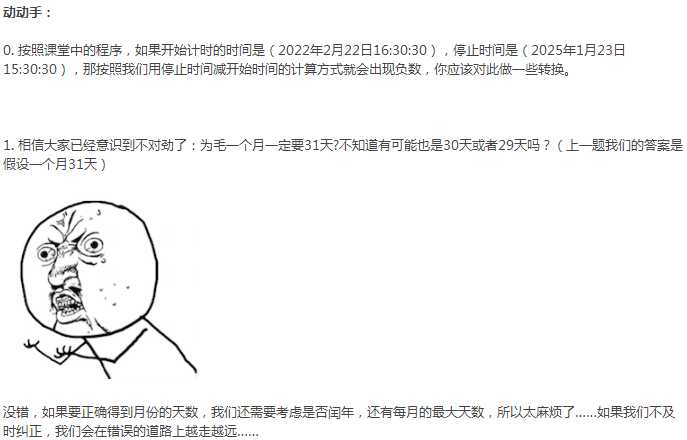
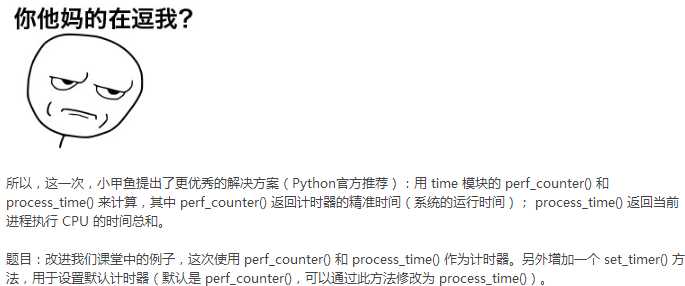
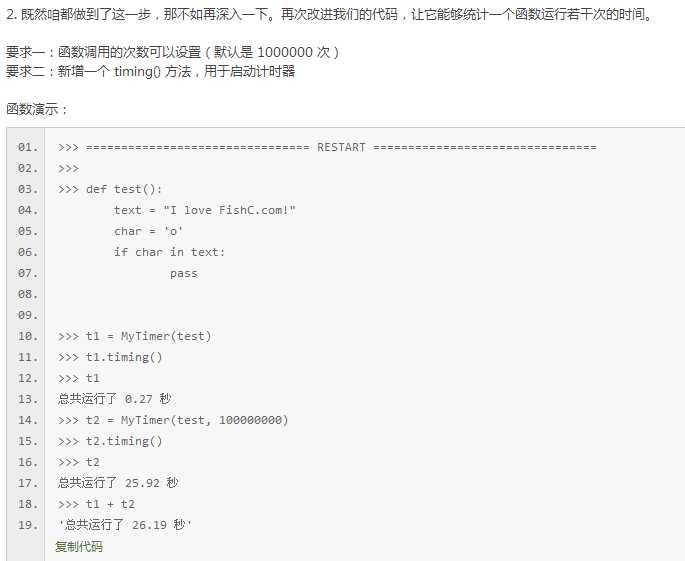
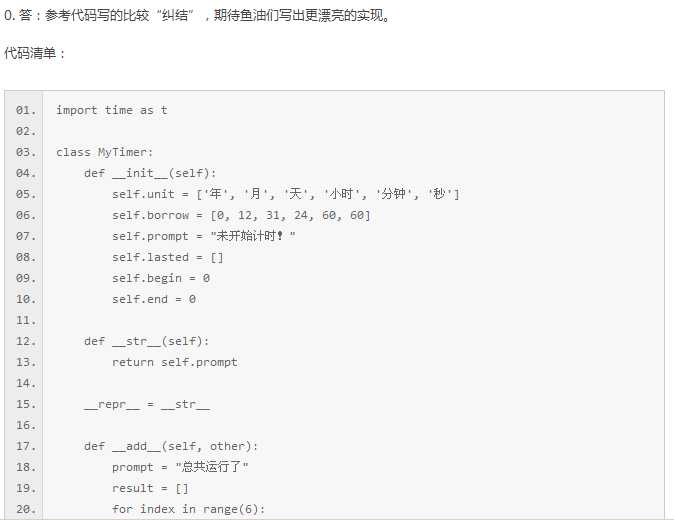
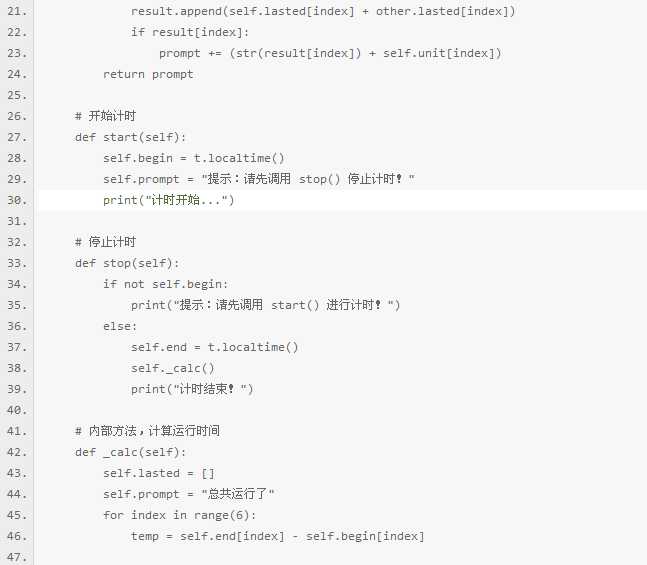
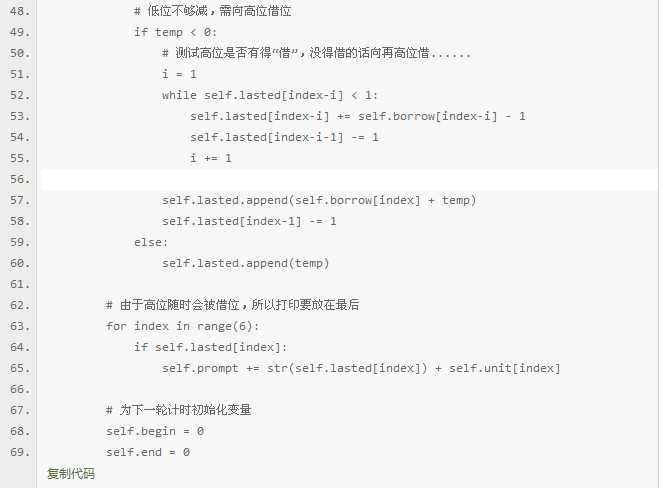
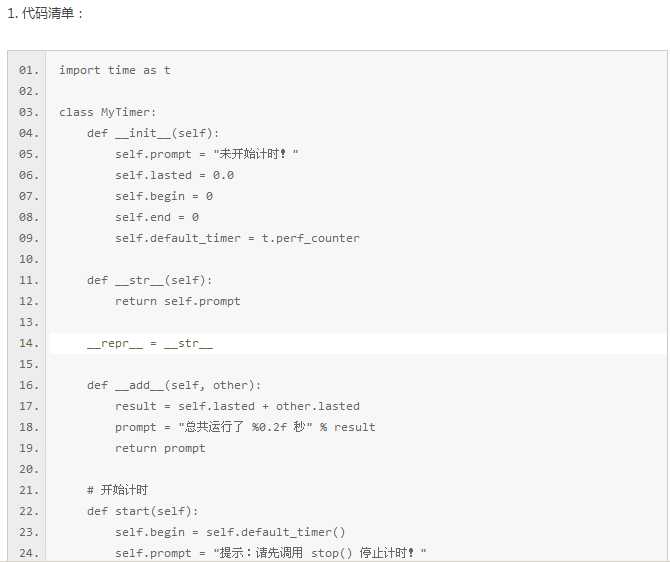
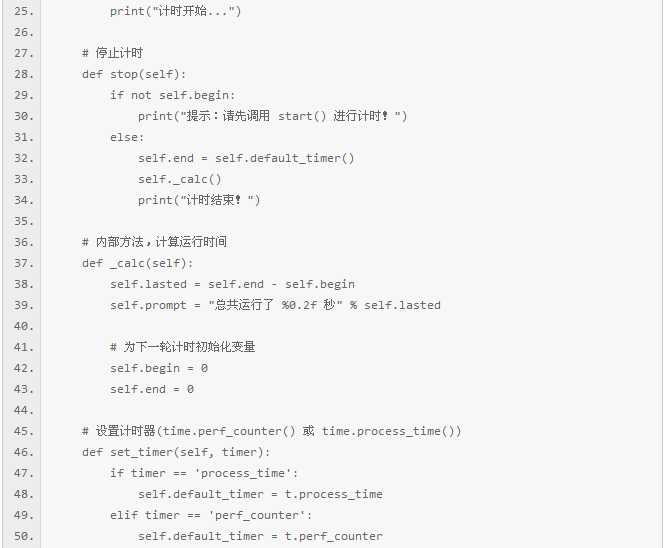

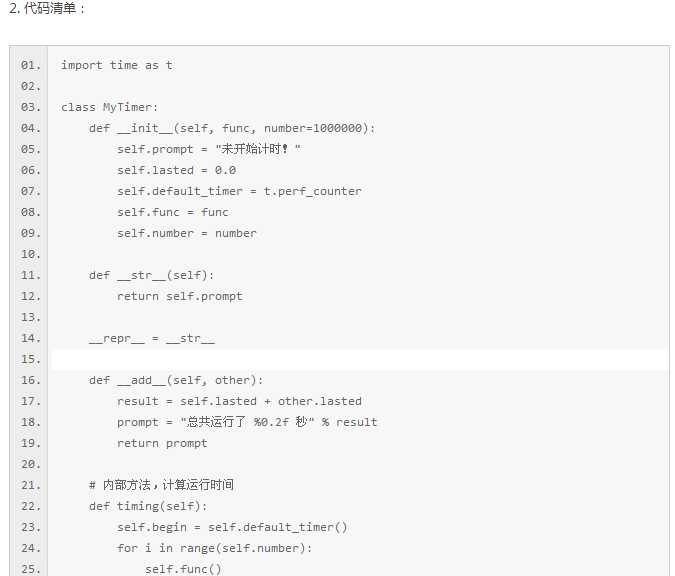
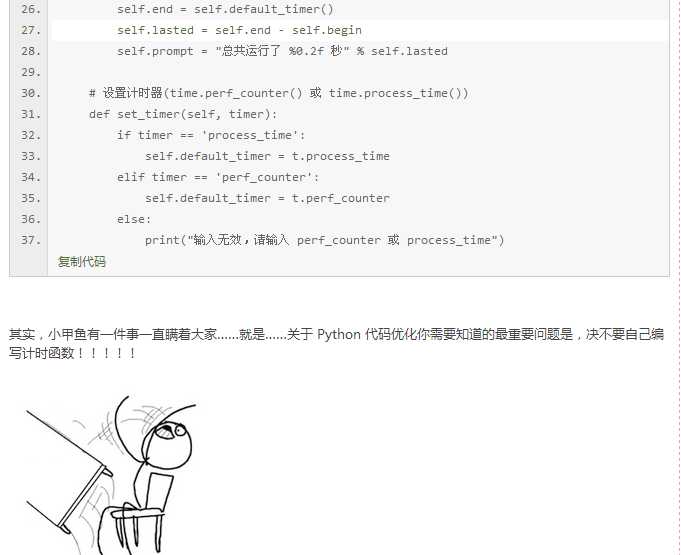
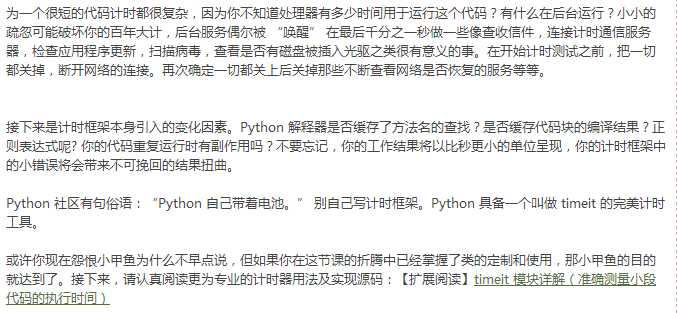
以上是关于课时44:魔法方法:简单定制的主要内容,如果未能解决你的问题,请参考以下文章